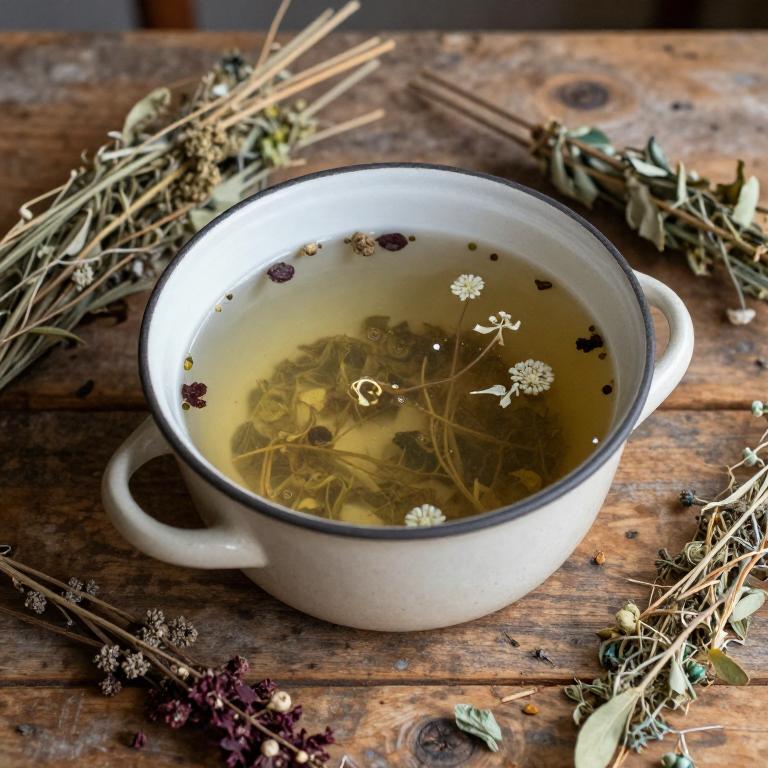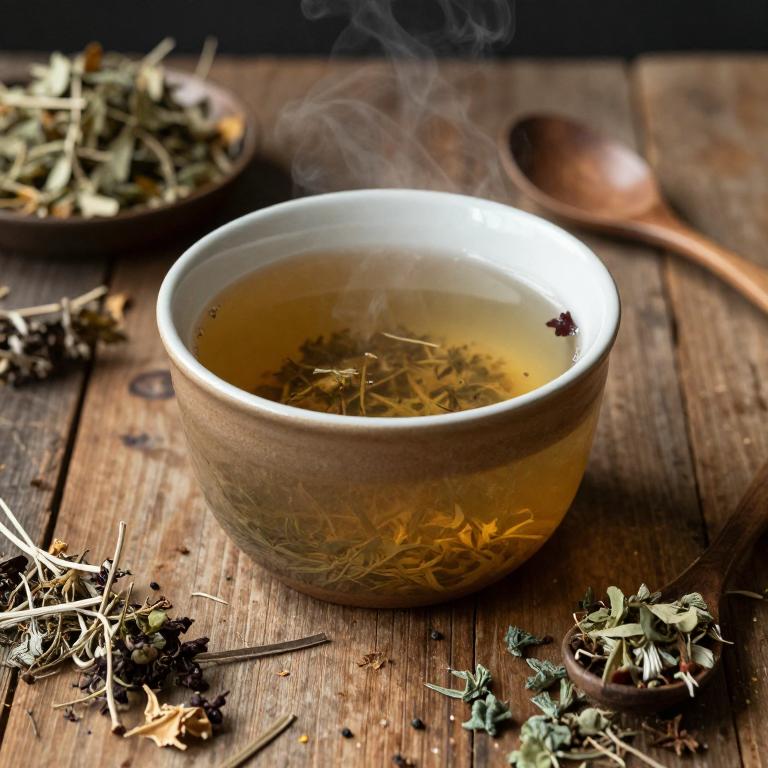10 Best Herbal Decoctions For Dental Plaque

Herbal decoctions have been traditionally used to help reduce dental plaque due to their antimicrobial and anti-inflammatory properties.
Common herbs such as neem, clove, and green tea are often incorporated into these decoctions because they contain compounds that inhibit the growth of bacteria associated with plaque formation. Preparing a decoction involves simmering the dried herbs in water for an extended period to extract their active components, which can then be used as a mouth rinse or applied directly to the teeth. These natural remedies are generally considered safe and can be used as a complementary approach to conventional dental hygiene practices.
However, they should not replace professional dental care and should be used in conjunction with regular brushing and flossing for optimal oral health.
Table of Contents
- 1. Salvia (Salvia officinalis)
- 2. Oregano (Origanum vulgare)
- 3. Ceylon cinnamon (Cinnamomum verum)
- 4. Licorice (Glycyrrhiza glabra)
- 5. Aloe vera (Aloe barbadensis)
- 6. Eucalyptus (Eucalyptus globulus)
- 7. Rosemary (Rosmarinus officinalis)
- 8. Peppermint (Mentha piperita)
- 9. Thyme (Thymus vulgaris)
- 10. Fennel (Foeniculum vulgare)
1. Salvia (Salvia officinalis)

Salvia officinalis, commonly known as sage, has been traditionally used for its antimicrobial properties, making it a valuable herb in the preparation of herbal decoctions for dental plaque.
When brewed into a decoction, sage contains compounds such as thujone and rosmarinic acid, which have been shown to inhibit the growth of bacteria associated with plaque formation. This natural remedy can be used as a mouth rinse to reduce bacterial adhesion and biofilm buildup on teeth. Its astringent properties also help to reduce gum inflammation and promote oral hygiene.
While sage decoctions may offer supportive benefits, they should not replace professional dental care and should be used under the guidance of a healthcare provider.
2. Oregano (Origanum vulgare)

Origanum vulgare, commonly known as oregano, has been traditionally used in herbal medicine for its antimicrobial properties, which may help in the prevention and treatment of dental plaque.
The essential oils found in oregano, particularly carvacrol and thymol, exhibit strong antibacterial effects against bacteria such as Streptococcus mutans, which are major contributors to plaque formation. Herbal decoctions made from dried oregano leaves can be prepared by simmering the leaves in water, creating a potent oral rinse that may reduce bacterial load in the mouth. Studies suggest that regular use of oregano-based mouthwashes or decoctions may support oral hygiene by inhibiting the growth of plaque-causing microorganisms.
However, it is important to consult with a healthcare professional before using oregano decoctions, especially for individuals with allergies or existing health conditions.
3. Ceylon cinnamon (Cinnamomum verum)

Cinnamomum verum, commonly known as true cinnamon, has been traditionally used in herbal medicine for its potential benefits in oral health, particularly in the treatment of dental plaque.
The essential oils found in cinnamon bark, such as cinnamaldehyde and eugenol, possess antimicrobial properties that can inhibit the growth of bacteria associated with plaque formation. Herbal decoctions made from cinnamon bark can be prepared by simmering the bark in water, creating a natural mouth rinse or topical application. These decoctions may help reduce bacterial biofilm on teeth, thus supporting the prevention of gingivitis and periodontal disease.
However, it is important to consult with a healthcare professional before using cinnamon-based remedies, as excessive use may cause irritation or sensitivity in the oral cavity.
4. Licorice (Glycyrrhiza glabra)

Glycyrrhiza glabra, commonly known as licorice root, has been traditionally used in herbal medicine for its potential benefits in oral health.
Herbal decoctions made from Glycyrrhiza glabra are believed to possess antimicrobial properties that may help reduce the bacterial load associated with dental plaque formation. Studies suggest that the flavonoids and glycyrrhizin in licorice root may inhibit the growth of Streptococcus mutans, a key contributor to plaque and cavities. These decoctions can be used as a natural alternative or adjunct to conventional oral hygiene practices.
However, while preliminary research is promising, more clinical trials are needed to fully establish the efficacy and safety of licorice root decoctions in the management of dental plaque.
5. Aloe vera (Aloe barbadensis)

Aloe barbadensis, commonly known as aloe vera, has been traditionally used for its soothing and healing properties, and its herbal decoctions have shown potential in reducing dental plaque.
The gel extracted from the aloe plant contains enzymes, antioxidants, and antimicrobial compounds that may inhibit the growth of bacteria responsible for plaque formation. When prepared as a decoction, aloe vera can be used as a natural mouthwash to help cleanse the teeth and gums, promoting oral hygiene. Studies suggest that its anti-inflammatory properties may also help reduce gum inflammation associated with plaque buildup.
While more research is needed, aloe barbadensis decoctions offer a promising complementary approach to conventional dental care for plaque management.
6. Eucalyptus (Eucalyptus globulus)

Eucalyptus globulus, commonly known as the Australian eucalyptus, has been traditionally used for its medicinal properties, including its potential benefits in oral health.
Herbal decoctions made from eucalyptus globulus leaves contain essential oils such as eucalyptol, which possess antimicrobial and anti-inflammatory properties. These properties may help reduce the bacterial load associated with dental plaque formation. Studies suggest that eucalyptus-based mouth rinses can inhibit the growth of Streptococcus mutans, a key contributor to plaque buildup.
However, while preliminary research is promising, more clinical trials are needed to fully establish its efficacy and safety for long-term use in dental care.
7. Rosemary (Rosmarinus officinalis)

Rosmarinus officinalis, commonly known as rosemary, has been traditionally used for its aromatic and medicinal properties, including its potential benefits for oral health.
Herbal decoctions made from rosemary leaves contain bioactive compounds such as rosmarinic acid and essential oils that exhibit antimicrobial and anti-inflammatory effects. These properties may help reduce the formation of dental plaque by inhibiting the growth of bacteria that contribute to biofilm buildup. Studies suggest that rosemary decoctions can be effective in supporting natural oral hygiene when used as a complementary treatment.
However, further clinical research is needed to fully establish its efficacy and safety for regular use in dental care routines.
8. Peppermint (Mentha piperita)

Mentha piperita, commonly known as peppermint, has been traditionally used in herbal medicine for its antimicrobial and refreshing properties.
When prepared as a herbal decoction, peppermint can help reduce the formation of dental plaque by inhibiting the growth of bacteria that contribute to plaque buildup. The essential oils in peppermint, such as menthol and menthone, possess mild antiseptic qualities that may aid in cleansing the mouth and promoting oral hygiene. Using peppermint decoctions as a mouth rinse or in combination with regular dental care can support the maintenance of healthy teeth and gums.
However, while peppermint may offer some benefits, it should not replace professional dental treatments or a comprehensive oral hygiene routine.
9. Thyme (Thymus vulgaris)

Thymus vulgaris, commonly known as thyme, has been traditionally used in herbal medicine for its antimicrobial and anti-inflammatory properties.
Herbal decoctions made from thymus vulgaris can be prepared by boiling the dried leaves and flowers in water, creating a potent infusion that may help reduce bacterial buildup in the mouth. Studies suggest that the essential oils in thyme, particularly thymol, possess strong antibacterial effects that may inhibit the growth of bacteria associated with dental plaque formation. When used as a mouth rinse or applied topically, thyme decoctions may support oral hygiene by preventing the adherence of plaque-forming bacteria to teeth.
However, further clinical research is needed to fully establish its efficacy and safety for long-term use in dental care.
10. Fennel (Foeniculum vulgare)

Foeniculum vulgare, commonly known as fennel, has been traditionally used in herbal medicine for its potential benefits in oral health.
Herbal decoctions made from fennel seeds are often prepared by boiling the dried seeds in water to extract their essential oils and active compounds. These decoctions are believed to possess antimicrobial properties that may help reduce the buildup of dental plaque by inhibiting the growth of bacteria such as Streptococcus mutans. Some studies suggest that the volatile oils in fennel, including anethol and limonene, contribute to its ability to combat oral pathogens.
While more research is needed to confirm its efficacy, fennel decoctions are considered a natural alternative for supporting dental hygiene and preventing plaque formation.